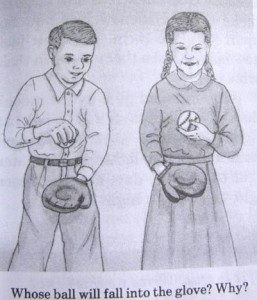Pop quiz, people. Answers at the bottom of the page.
We must never do experiments to test God’s words. Write yes for the questions that would be all right to test by doing experiments. Write no for the ones that should not be tested.
a. What kind of gasoline provides the best fuel mileage?
b. How well does a garden produce if it is planted on Sunday?
c. How fast will this car go?
d. Which pair of shoes will last the longest?
e. How well does fiberglass insulation burn?
f. How long will a man’s hair grow if it is not cut?
This is from God’s Wonderful World, a Grade 5 homeschool science textbook produced by Rod  and Staff Publishers Inc. of Kentucky. I am the fascinated owner of both the Grade 3 and Grade 5 science curricula, including the teacher’s manuals, gleaned with glad cries from the freebies shed at our local landfill.
and Staff Publishers Inc. of Kentucky. I am the fascinated owner of both the Grade 3 and Grade 5 science curricula, including the teacher’s manuals, gleaned with glad cries from the freebies shed at our local landfill.
Rod and Staff is an Anabaptist/Mennonite outfit, which means all the little girls pictured have long braids, long sleeves, and long skirts, while the little boys all have short back-and-sides and proper shirts with buttons. Otherwise, the content looks to be pretty standard for that market: science as a means of properly appreciating the awesomeness of God’s creative abilities, especially seeing as He managed to dream the whole shebang up in only six terrestrial days. Similar creationist homeschool texts are put out by a long list of Christian publishers, including Bob Jones University Press, whose website makes the agenda abundantly explicit:
Every BJU Press science textbook points out the infinite wisdom and the designing hand of God in His creation and its laws. We teach students that science is a powerful tool for obeying God’s first command to humans, the command to have dominion over God’s world (Genesis 1:28). We also teach students to analyze carefully the findings of modern science and to interpret them through the only source of lasting truth, God’s Word.
Back to my accidental treasure trove. The Grade 3 text (God’s Protected World) is organized around Noah and the Great Flood, with the overarching theme that God has organized things so that “you, too, can trust and obey God like faithful Noah.” In fact, God gets some sort of credit on almost every page, and certainly in every section. The first unit, appropriately, is all about water. The subtitle of the Grade 5 text is “with special reference to the Book of Psalms,” and – while God is not quite so omnipresent in its pages as in the Grade 3 curriculum – it is still permeated with piety and lots of bible verses.
 But the piety aside, do these books teach good science? Some of the sections might be indistinguishable from material in secular textbooks: inertia, friction, chemical reactions, sound waves, the habits of spiders and snakes. Some of the activities and experiments are ones that I remember from my own (very) distant public schooling: fun with litmus paper, iron filings, pet caterpillars in glass jars. But the answer is still no. Curricula like these cut science off at the knees in their first foundational pages.
But the piety aside, do these books teach good science? Some of the sections might be indistinguishable from material in secular textbooks: inertia, friction, chemical reactions, sound waves, the habits of spiders and snakes. Some of the activities and experiments are ones that I remember from my own (very) distant public schooling: fun with litmus paper, iron filings, pet caterpillars in glass jars. But the answer is still no. Curricula like these cut science off at the knees in their first foundational pages.
Both curricula begin with the immutable truth of the six-day creation and the Great Flood, the infallible reliability of the Bible as the ultimate science text, and the foolishness of secular science:
[Grade 5 text, p.13, after explaining how the Flood was the prime factor in the formation of geological features] We cannot explain exactly what happened in the Flood or how God could make a worldwide flood. But we do know there was such a flood because the Bible says so.
Ungodly men have tried to explain how the earth became as it is today. They say that it all just happened in natural ways and that God had little or nothing to do with it. This false teaching is called evolution. But since the Bible tells us about the Creation and the Flood, we know it was God who made the earth as it is today. In the beginning, He created everything in six days. Later, He sent a yearlong flood that drowned all the wicked people and made great changes on the earth.
A little further on, the boundary between permissible and impermissible inquiry is laid out (with a nod to the proper role of women):
We experiment frequently. Father experiments to discover what kind of gasoline makes his car run best. Mother experiments to discover how to make better bread. Jerry experiments to see which kind of sled will slide best in deep snow. We have many questions that experiments help us to answer.
However, we must never question what the Bible says. The Bible is always true. If the Bible says something is true, we need no experiment to prove that it is true. Neither will any experiment ever show the Bible to be wrong. But what about cases where men say the Bible is untrue? For instance, the Bible says that God created the world, but many scientists say the world was formed in some other way. We know these scientists are not telling the truth. Whenever the Bible and scientists disagree, we know that the Bible is true and that the scientists are in error. God’s Word is always the highest authority.
So there you have it. Iron Age adaptations of Bronze Age myths trump the insights and discoveries of modern science. The rest is just icing on the cake, though some of the peculiar accommodations made by the textbooks would be hilarious if they were not being fed to children. Orogeny boils down to vulcanism, crumpling in the Earth’s surface caused by the Flood, and plain old creation, like God’s own flour-and-water relief map. Petroleum is a gift from God. God not only knows exactly how many stars there are, but has named each and every one of them. The intermixture of religious propaganda with elementary science poisons the whole.
Of course, not all homeschooled kids are exposed to bilge of this sort – there are many reasons given for homeschooling – but it seems most of them are. As of 2007, in the most recent figures available for the US, religious reasons accounted for 83% (1,257,000) of homeschooled children, with the parents of 36% (540,000) citing religion as the primary motive. Canada has only about 60,000 homeschoolers and data about their motives are scarce, but the same publishers’ outpourings are peddled by Canadian homeschool marketers. Altogether, that’s a lot of children growing up with a pathetically skewed view of science.
[Answers: a. yes; b. no; c. no; d. yes; e. yes; f. no.]
